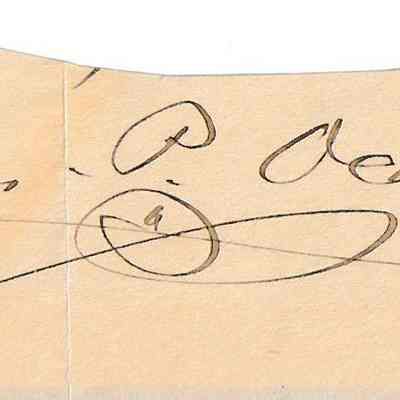Thomas Ochiltree [Signature]
Name/Title
Thomas Ochiltree [Signature]Description
"Thomas P. Ochiltree" signature cut from a letter addressed to politician David Bremner Henderson. These two men served together in the U.S. House of Representatives from 1883-1885; Henderson represented Iowa's 3rd District and Ochiltree represented Texas's 7th District.Context
Thomas Peck Ochiltree, Texas legislator, politician, promoter, newspaperman, and soldier, was born at Livingston, Alabama, on October 26, 1839, the son of William Beck and Novalene (Peck) Ochiltree. His family moved to East Texas that year, and he was reared at Nacogdoches and Marshall. He fought Indians with John G. Walker's company of Texas Rangers in 1854–55. In 1856 he became assistant chief clerk and sergeant at arms of the Texas House of Representatives, and in 1857 he was admitted to the bar by a special act of the legislature. Ochiltree practiced law in partnership with his father in Marshall and Jefferson. According to legend, when his father once erected a shingle that read “W. B. Ochiltree and Son,” the younger man replaced it with one that read “Thomas P. Ochiltree and Father.” Ochiltree was politically active, serving as secretary of the state Democratic convention in 1859 and delegate to the Democratic national convention in 1860. He edited the Star State Jeffersonian, a Jefferson newspaper, in 1860–61, then enlisted in Hood's Texas Brigade, in which eventually he was promoted to major. Ochiltree served on the staffs of Henry Hopkins Sibley, Thomas Green, Richard Taylor, Samuel Bell Maxey, and James Longstreet in the armies of North Virginia, New Mexico, Louisiana, Indian Territory, and Arkansas. He was brevetted a colonel four days before Robert E. Lee's surrender, captured near Appomattox, sent to prison camp on Johnson's Island in Lake Erie, and released when a friend appealed on his behalf to President Andrew Johnson. After the Civil War, Ochiltree spent a few months in Europe. Upon returning to the United States, he continued newspaper work by writing for the New York News and editing the Houston Daily Telegraph in 1866–67. He later wrote the "Ranger" column for the New York Sportsman. In 1867 he made another extended trip to Europe as representative of the banking and shipping firm T. H. MacMahon and Company, which wanted to establish a steamship line from Liverpool to Galveston. During Reconstruction he became noted as a maverick in Texas politics. In 1868 he supported U. S. Grant for president and later promoted fair treatment for Black citizens. A colorful figure and powerful speaker, Ochiltree returned to public service as commissioner of emigration for Texas (1870–73), and as United States marshal for the Eastern District of Texas (1874). In 1882, he ran as an Independent for Congress and won a seat as representative of the Galveston district in the Forty-eighth Congress (1883–85). He played a role in lobbying for a deepwater harbor at Galveston and later was a representative and general counsel for the mining, railroad, telegraph, and cable interests of J. W. Mackay and investment counselor to the Marquis de Mores and John Thomas North. Between 1865 and 1902 he made more than sixty trips to Europe to promote Texas interests. Upon retirement from Congress, Ochiltree made his home in New York. He died at Hot Springs, Virginia, on November 25, 1902. He was buried in Greenwood Cemetery, Brooklyn, New York, but was reinterred in Mount Hope Cemetery, New York, on November 8, 1903.Category
Government & Politics
TSHA Categories

